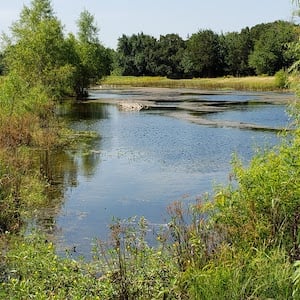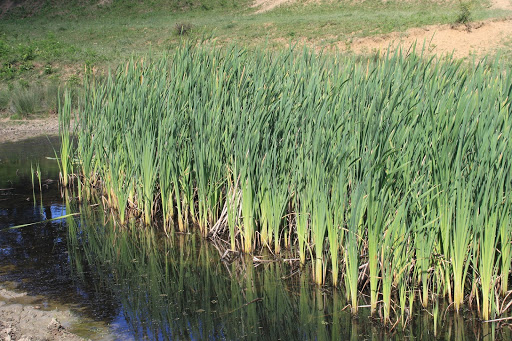Treating your pond or lake with herbicides can be a delicate, yet effective management strategy, but you do need to follow a few simple guidelines to keep it safe!
Will herbicides kill my fish?
We get this question all the time and the answer is ... it depends. It is true, the use of aquatic rated herbicides is often the best choice for the effective control or management of pond vegetation. However, these chemicals are sometimes restricted on their uses, and some are highly selective on which species of vegetations they treat. These types of warnings raise a cautionary flag in many pond owners’ eyes. At the very least, before you buy or treat with any herbicide, you need to be certain about which types of vegetation you are targeting, or you may just be throwing money down the drain. And, the best way to feel comfortable with your decision to use herbicides in the treatment of aquatic vegetation is to be well informed. We'll try to help.
Only use herbicides rated for aquatic use
When the appropriate herbicides are used as directed on the label on the vegetation prescribed in the instructions, then no, those chemicals should not harm your fish through their application. Herbicides rated for aquatic use have been tested by their manufacturer to be safe to use in aquatic systems and these tests have been accepted by the EPA (sample aquatic-use label). Now if you end up treating your ponds personally, you may have noticed that certain herbicides can have the same active ingredient, but one might be labeled for aquatic use and the other is not. This is where I can’t stress enough to you, get the herbicide that is rated for aquatic use. Yes, they have the same active ingredient and may be cheaper, but different manufacturers use different chemicals for fillers and diluting ingredients when it comes to the Other Ingredients portion of that label. These variations in chemicals have not been tested on aquatic environments and therefore the outcome is unknown.
Understand the secondary effects of the herbicide
 If you are deciding to treat your own pond and are reading this for some key pointers, you probably noticed that in the last paragraph that these herbicides will not directly kill your fish. “Wait, I bought aquatic rated herbicides like you said; shouldn’t they be safe?” Yes, the chemicals themselves won’t cause any harm to your fish. The problems start to appear when they are not applied properly and the most common mistake is treating too much vegetation at once. When that happens, the herbicides do their job just like they were designed and kill the vegetation, which is good, right? Well, not exactly because when all this vegetation dies, the plant matter sinks to the bottom of the pond or lake and begins to decay and decompose. In the process of this decomposition, bacteria and microbes are consuming the dead matter and reproducing and expanding their colonies in this time of abundant resources. These microbes and bacteria consume the dissolved oxygen in the water - the same way fish do. So, if the colonies expand too large, too fast, then the oxygen demand for your pond may outweigh the amount that can be replaced over a given time. This can cause a fish kill. The size, depth, wind, and wave action in the pond will determine the severity of the fill kill.
If you are deciding to treat your own pond and are reading this for some key pointers, you probably noticed that in the last paragraph that these herbicides will not directly kill your fish. “Wait, I bought aquatic rated herbicides like you said; shouldn’t they be safe?” Yes, the chemicals themselves won’t cause any harm to your fish. The problems start to appear when they are not applied properly and the most common mistake is treating too much vegetation at once. When that happens, the herbicides do their job just like they were designed and kill the vegetation, which is good, right? Well, not exactly because when all this vegetation dies, the plant matter sinks to the bottom of the pond or lake and begins to decay and decompose. In the process of this decomposition, bacteria and microbes are consuming the dead matter and reproducing and expanding their colonies in this time of abundant resources. These microbes and bacteria consume the dissolved oxygen in the water - the same way fish do. So, if the colonies expand too large, too fast, then the oxygen demand for your pond may outweigh the amount that can be replaced over a given time. This can cause a fish kill. The size, depth, wind, and wave action in the pond will determine the severity of the fill kill.
Treat with herbicides judiciously
Here is how you overcome this problem. Only treat a small portion (20%-25%) of the total pond surface area at a time. If there are multiple species and it is necessary to treat with multiple chemicals, focus on one species at a time. Do not treat with multiple herbicides in one treatment. This will increase your risk of overdoing it and put your fish in danger. After your initial treatment wait a minimum of 2 weeks before your next treatment. This will give your pond biota plenty of time to decompose the dead plant matter, and the microbes and bacteria colonies to return to their normal levels. The best management strategy for dealing with aquatic vegetation is to hop on it early in the year before it takes over your fishery. As you can see with the small treatment areas and the wait time in between, if allowed to get out of hand you may spend more time treating your pond and less time enjoying it.
Consider hiring a professional
Treating your pond or lake with herbicides can be a delicate, but effective management strategy. Oftentimes it is best left to pond management professionals like those here at Pond King. However, if you manage the vegetation in the pond yourself, here are some final reminders.
- When you purchase herbicides to treat your pond, be sure and read the label, THE LABEL IS THE LAW.
- Only use aquatic-rated herbicides and only treat a small portion of your pond per treatment with plenty of time between treatments.
If you'd like to learn more, please visit our blog "Aquatic Weed Control for Ponds or Lakes." And, if you have any other questions about aquatic herbicides and the treatment of your pond vegetation feel free to contact me anytime at garrett@pondking.com.
See y’all down at the pond.




